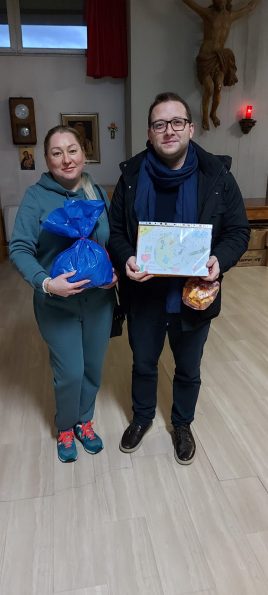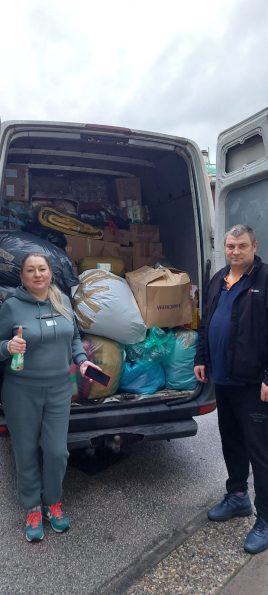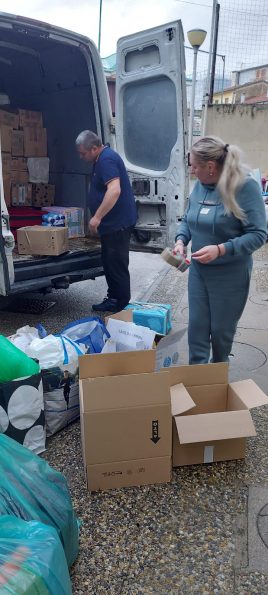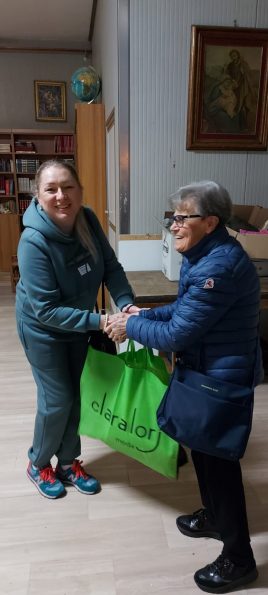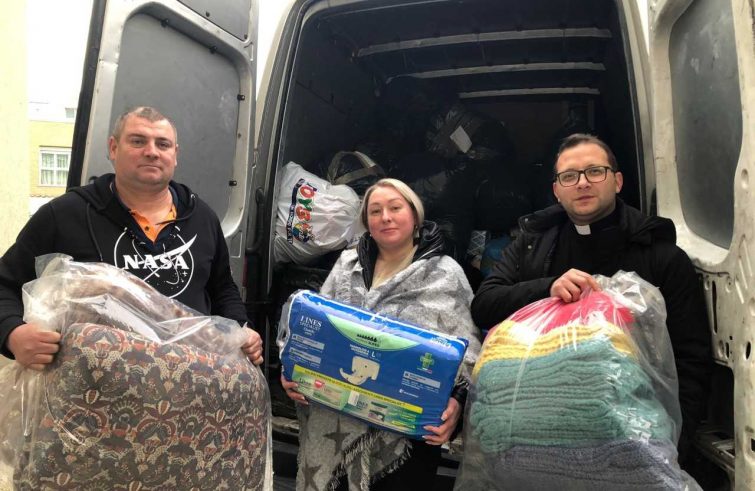
A truckload of humanitarian aid for people living in Kizman and villages in the province of Chernivci will be on its way during this Christmas season, as it has every Friday since the outbreak of war in Ukraine. There will also be Christmas presents for 500 children. The solidarity effort is organised by Fr Gabriele Benejaru, head of the Migrantes department in the diocese of Prato and deputy parish priest of the Church of the Resurrection, where all the humanitarian aid is collected and subsequently delivered. The truck can contain 1.5 tons of food and basic necessities. A top priority in the last few weeks has been the purchase of 7-kilowatt generators, which are indispensable for all those people left without electricity in the freezing Ukrainian winter, as a result of the frequent blackouts caused by the war. Over the last few days the community is Prato was urgently asked for winter clothing for 50 children from Kyiv who have been taken in by the Doneaza association in Romania. Medical supplies for the elderly, medication for colds, diapers for the elderly, as well as wheelchairs, are also needed.
 “We will do everything we can to help people go on with their lives and regain hope as long as the war in Ukraine continues,” Fr Benejaru told SIR. “We are but a drop in the ocean, yet without that drop there wouldn’t be an entire ocean. I only regret that when the conflict was reported on TV we could have done more. But I always remind my parishioners that charity has no timetable. I have great faith in the Divine Providence and I trust that aid will be forthcoming, whether it is given by wealthy people or by those who are less well off.”
“We will do everything we can to help people go on with their lives and regain hope as long as the war in Ukraine continues,” Fr Benejaru told SIR. “We are but a drop in the ocean, yet without that drop there wouldn’t be an entire ocean. I only regret that when the conflict was reported on TV we could have done more. But I always remind my parishioners that charity has no timetable. I have great faith in the Divine Providence and I trust that aid will be forthcoming, whether it is given by wealthy people or by those who are less well off.”
Anyta Mitiugaieva and Slavik Fisuk, two Ukrainians who have been living in the small Tuscan town for years, offered to deliver the aid on a voluntary basis. Every Friday or Saturday, barring occasional impediments due to truck maintenance, Anyta and Slavik leave with a 1.5-ton truckload of humanitarian aid.
It is a 24-hour journey, with very long lines at the Ukrainian border, heading for the kindergartens, hospitals and abandoned schools where the refugees are sheltering.
The truck is filled with blankets and clothing items, canned food, medicines, diapers for adults and the elderly, powdered or long-life milk. All items are purchased thanks to donations from private citizens, or through food and basic necessities collections organised by the diocese. The latest charity collection was held on 15 December during the Advent Vigil in the cathedral, with young people and with Bishop Giovanni Nerbini.
- foto: Anyta Mitiugaieva
A decline in donations over the past few months. Over the past few months, however, there was a drop in donations as a result of reduced media attention and news coverage. “We were desperate”, says Anyta Mitiugaieva, “solidarity had stopped coming in and we were not even sure how to cover the cost of fuel. We need at least 1,000 EUR for travelling there and back.” Anyta is seen as a kind of angel by the fellow nationals she meets in her home country. “They are so fond of me and I am happy to be of help”. She is originally from Donetsk, located in the occupied Donbass region. Her parents still live there but she cannot send them any help. Her brother is in Kyiv. “I send parcels to him.” She belongs to the Orthodox Church: “It makes no difference to me whether I enter a Ukrainian or a Russian church”, she points out. “I light a candle and say a prayer. Everyone is the same to me. God is one.”
They leave at night with Slavik’s truck and wait long hours at the customs, amidst 7 to 12 km-long lines of vehicles. The long lines are due to the fact that customs officials charge around 300/400 Euros to allow goods through. In an attempt to bypass corruption, Anya presents a form stamped by the Migrantes office certifying the presence of humanitarian aid. Slavik remains on the other side of the border to avert any risk of being conscripted. She departs alone driving the van for another five or six hours before arriving in the Černivci area.
“Even though I’m afraid, I try not to think about the risk of shelling and I keep driving”,
she says. She delivers the goods to the mayor of Kizman, who will then arrange their distribution.
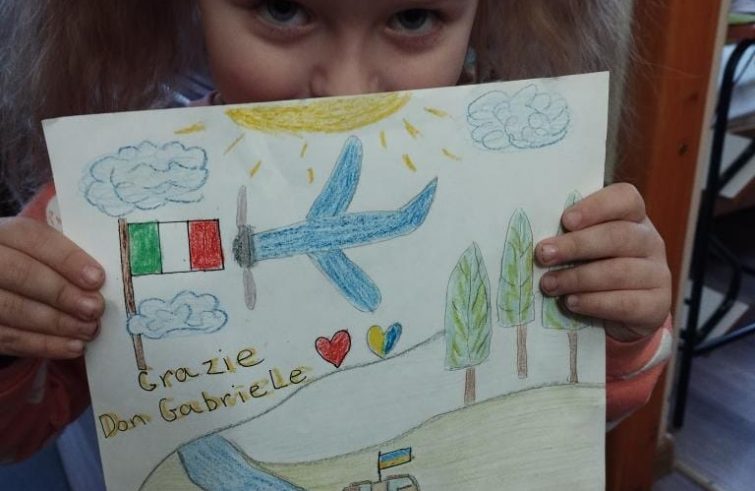 On most occasions Anyta sleeps in the van. She happened to remain up to two weeks in the area helping lonely elderly people to clean their houses, or visiting needy families. When she departs for Italy, instead of the aid parcels , women and children seeking humanitarian protection in Italy travel with her. They are welcomed by the dioceses of Prato and Florence; some fifty families so far. “Many have returned to Ukraine but many more are still fleeing” says Anyta. “The terrible tragedy they are experiencing is beyond comprehension until you see it for yourself. There is no water or electricity. In the kindergarten the meals for the children cannot be cooked and they have no other option than to eat cold food. Many of them have been orphaned, others are ill. Many families have no homes, all they have are the clothes they wear.” Anyta is currently in Italy but she is ready to leave for the next trip. Be it a weekday, Christmas or New Year’s Day, it will make no difference to her. Solidarity never stops.
On most occasions Anyta sleeps in the van. She happened to remain up to two weeks in the area helping lonely elderly people to clean their houses, or visiting needy families. When she departs for Italy, instead of the aid parcels , women and children seeking humanitarian protection in Italy travel with her. They are welcomed by the dioceses of Prato and Florence; some fifty families so far. “Many have returned to Ukraine but many more are still fleeing” says Anyta. “The terrible tragedy they are experiencing is beyond comprehension until you see it for yourself. There is no water or electricity. In the kindergarten the meals for the children cannot be cooked and they have no other option than to eat cold food. Many of them have been orphaned, others are ill. Many families have no homes, all they have are the clothes they wear.” Anyta is currently in Italy but she is ready to leave for the next trip. Be it a weekday, Christmas or New Year’s Day, it will make no difference to her. Solidarity never stops.

